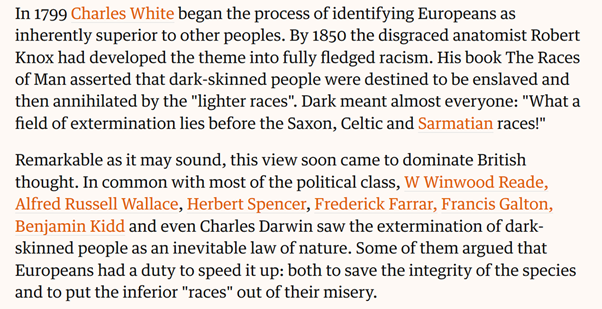We should know as much about the atrocities committed by British governments in the 20th Century as the Germans do about theirs. But most people in the UK would have no idea what I’m referring to.
In this week’s column I try to put that right.
theguardian.com/commentisfree/…
In this week’s column I try to put that right.
theguardian.com/commentisfree/…
This is Sir Evelyn Baring.
As governor of Kenya from 1952-59, he commissioned a system of concentration and slave labour camps, in which tens of thousands were tortured and mutilated, beaten and burnt to death.
He is Dominic Cummings’s grandfather-in-law.
As governor of Kenya from 1952-59, he commissioned a system of concentration and slave labour camps, in which tens of thousands were tortured and mutilated, beaten and burnt to death.
He is Dominic Cummings’s grandfather-in-law.

Every schoolchild should know his name. But his cover-ups and deceptions were so ruthless and effective, and supported so comprehensively by the British government, that his great crimes are almost unknown to us.
Please remember, this was post-war. He reinvented the concentration camp and slave labour system *after* the Allies had defeated Germany to "save the world from barbarism". When he returned from Kenya, he was made a baron, in recognition of his services to the British empire.
I was brought up to believe that men like this were the epitome of honour and decency. He was an upstanding, dignified, patrician and highly respected mass murderer.
His family fortune was built on slavery, so perhaps it was easy for him to reinvent the slave labour camp in the 1950s. But the wealth of almost the entire British establishment was built on slavery and grabbing land, labour and loot in Britain, Ireland and across the empire.
The mass murder, theft and barbarism on which their wealth and power was built required a justifying ideology. That ideology is called racism. Racism? An ideology? Yes. It was systematically constructed, as an explanation and justification for conquest and looting.
It is hard for many people to understand the extent to which racism was invented, as a deliberate, justifying project. Sven Lindqvist explains it in Exterminate All the Brutes. It began, as a systemic theory, in Britain. 

Sir Evelyn Baring was the personification of these attitudes. They were inculcated, by subtle and less subtle means, through the English private school system. As WH Auden wrote, “The best reason I have for opposing fascism is that at school I lived in a fascist state."
The private school system, steeped in astonishing and brutalising cruelty, sexual, emotional and physical abuse, where boys boarded from the age of 7 or 8, was designed to break attachments to home and family, and replace them with attachments to state, class and empire.
It created a kamikaze caste of young men, detached from their own feelings and the feelings of other people, fanatically devoted to king and country. I try to explain it here. monbiot.com/2013/01/28/ano…
The attitudes it inculcated still infest our political class and govern our perceptions of ourselves. Our task is not only to recover our history. It is also to recover our psychology.
The radical incompetence of British leaders, epitomised by Boris Johnson, is not only the result of selection by class, not merit. It's also because they are taught not to care. Millions have their lives ruined because, from the private school perspective, they're expendable.
This is why a 22 year old footballer has a clearer idea of what this country needs than the Prime Minister does.
When you review these histories, you begin to realise how much there is at stake, and why the likes of Johnson and Cummings will stop at nothing. It's not just wealth and power they are defending, but an entire infrastructure of identity and belief, propped up by massive lies.
If the lies collapse, so does the belief system. Then the game's up for Conservatism and the interests it exists to defend. As the dominant classes sense their psychic power weakening, they frantically seek to shore it up. Hence the culture war Johnson is trying to start.
To admit to these national histories is, when you've been through the private school system, to admit to your own history: the abuses and brutalisation that trained you to dominate others without a flicker of empathy or guilt. And then your own psychic defences are at grave risk.
So this issue, that might seem obscure and "all a long time ago" to some, is actually existential to the dominant classes. If they can no longer mesmerise themselves and the rest of the nation with these massive lies, they are, in all senses, lost.
I have a disquieting sense that we have scratched only the surface of this. I feel there is likely to be a lot more to discover, both in British history and in the way it plays out through current politics and power structures.
• • •
Missing some Tweet in this thread? You can try to
force a refresh




